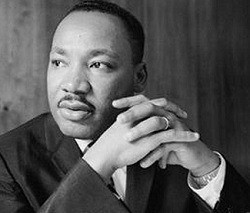Apr 15, 2025
Apr 15, 2025
 Dr. Martin Luther King Jr. was a Black minister who led the Civil Rights Movement in the United States. He was an African-American Baptist Church minister, and was born in Atlanta, Georgia on January 15,
Dr. Martin Luther King Jr. was a Black minister who led the Civil Rights Movement in the United States. He was an African-American Baptist Church minister, and was born in Atlanta, Georgia on January 15,
1929. He attended the Crozar Theological Seminary, and did his doctorate in Philosophy from Boston University in 1955. After his ordination as a pastor of the Exeter Avenue Baptist Church in Montgomery, Alabama in 1955 just before a Black woman Rosa Parks (b. 1913) generated a controversy by refusing to give up her seat to a White man on one of the city's public transport buses. Following this incident Dr. King organised a citywide bus boycott by Black bus users.
This attracted wide national attention, and marked the launch of the American Civil Rights Movement.
Dr. King was a powerful orator, and keenly followed Mohandas Karamchand Gandhi's (1869-1948) ideals and principles and pursued reforms through non-violent means. In 1963 he organised a peaceful march to the Lincoln Memorial in Washington in which around 2,00000 people took part. It ended with his celebrated, " I have a dream speech". The Civil Rights Movement gained nationwide support specially after John F, Kennedy became the 35th US President in 1960. Kennedy was the youngest President, and the first Roman Catholic ever elected to the post. In 1964 Dr. King was awarded the Nobel Peace Prize.
On July 2, 1964, the Civil Rights Act was passed outlawing all forms of discrimination involving Blacks in public facilities, living accomodation and schools. Later, Dr. King was in the process of organising another march for improving living conditions for the poor and disadvantaged Americans of all races. Sadly, in this process he was assassinated at a Motel in Memphis, Tennessee by James Earl Ray
on April 4,1968. Later, Dr. King's assassin was traced down and arrested at London's Heathrow Airport, and he is now in prison in Tennessee
Reference:"100 Men Who Shaped World History" by Bill Yenne, Gemini Books, New Delhi, 1997.
18-Apr-2020
More by : Dr. Frank S. K. Barar